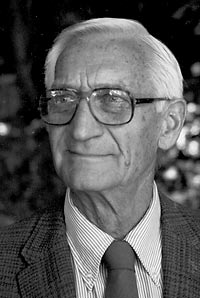UC Berkeley Press Release
Francis Violich, emeritus professor of city planning and landscape architecture, dies
BERKELEY – Francis Violich, professor emeritus in city and regional planning and in landscape architecture at the University of California, Berkeley, and a founder of the Telesis Group, which lent a progressive status to city planning in the Bay Area, died Aug. 21 of natural causes at his home in Berkeley. He was 94.
 Francis Violich |
Born to Croatian parents in San Francisco in 1911, Violich grew up in a home a few hundred feet to the south of Golden Gate Park and credited his interest in landscape architecture to his mother's passion for gardening and her affinity for the environment.
He graduated from UC Berkeley in 1934 with a bachelor's degree in landscape architecture. Two years later, he was awarded a Heller Charitable & Educational Fund fellowship for graduate studies in city planning at Harvard University and the Massachusetts Institute of Technology, where he learned how to design urban places to resolve social inequality.
Violich conducted study tours in Europe, Yugoslavia and Latin America that he said helped him establish a multi-cultural approach to his professional practice, teaching, research and community activities.
In 1941, he joined the landscape architecture and city and regional planning faculties at UC Berkeley. He served as chair of the department of landscape architecture and environmental planning from 1962-1964.
In the late '40s and 1950s, Violich helped found Telesis, which the American Planning Association has lauded as the "first volunteer-based group to bring multiple fields together successfully in a comprehensive approach to environmental development in a regional context." The association awarded Telesis national historical landmark status.
Telesis also laid the groundwork for the establishment of UC Berkeley's city and regional planning department in 1948 and the formation 10 years later of the College of Environmental Design, which included the departments of city and regional planning, visual studies, landscape architecture and architecture.
Violich published his first book, "Cities of Latin America: Planning and Housing in the South," in 1944. It was considered the first comprehensive work on planning and housing in Latin America and, after its publication, Violich was invited by what became the Organization of American States to start an exchange program on urban planning in the region.
His second book, "Urban Planning for Latin America: The Challenge for Metropolitan Growth," was co-written with Robert Daughters, the head of the urban development section at the Inter-American Bank in Washington, D.C. It was published in 1987 and drew upon decades of their work applying American methods to the needs of Latin American cities as they evolved into vast metropolitan regions.
When Violich retired from UC Berkeley in 1976, Donald Foley, then chair of the city and regional planning department, recognized his contribution to promoting interest in Latin American planning and his influence on the character of urban planning and environmental design. Foley also noted Violich's effectiveness in attracting and advising Latin American students to the College of Environmental Design.
Violich served as a planning consultant to Sao Paulo and Caracas and as an adviser to educational programs in Venezuela and Chile and to the Peace Corps, Pan American Union, Ford Foundation and other groups interested in urban planning in Latin America.
"Throughout all of this," Foley said, "Francis Violich has brought an intense commitment: a persistent belief that we can improve the environment around us and that we can improve the environmental design processes by which we intervene."
In Violich's 1998 book, "The Bridge to Dalmatia: A Search for the Meaning of Place," he examined post-war reconstruction, environmental eco-history, planning of urban areas in Croatia, and particularly the environmental cultural identity of people along Croatia's Dalmatian coast.
"The concept of the bridge, in my mind," he wrote, "applies to the foreign people who come to the U.S. and bring us their cultural concepts and in that way both enrich and take away from the Anglo-Saxon culture which is more materialistic and individualist, breaking up families and shifting the economic gain into the hands of a few."
Today, there is an active exchange program between the urban planning departments at UC Berkeley and the University of Zagreb in Croatia, where Violich spent a year in 1979 on a Fulbright Fellowship. His earliest research in Dalmatia began in 1937.
Violich launched the exchange program in 1996, contributing royalties from his Dalmatia book, and vowed to leave his Dalmatian research collection to UC Berkeley.
Violich won several awards, including a National Planning Pioneer designation by the American Institute of Planners in 1992 and recognition in 1997 as co-founder of UC Berkeley's city and regional planning department. He was given a Distinguished Alumnus Award by the College of Environmental Design and its alumni in 1999 in recognition of his accomplishments.
Violich placed in the finals of the Prix De Rome twice and was a member of the American Academy in Rome.
"Fran's life is a reminder that we stand on the shoulders of very special human beings," said Harrison Fraker, dean of the college.
Violich is survived by his sister, Clementine Nelson of San Francisco, and by a brother, John Violich of Kentfield, Calif. He is also survived by three sons: Antonio Violich of Watsonville, Calif., Frano Violich of Boston and Mario Violich of Venice, Calif.; daughters, Carmen Violich-Goodin of Berkeley and Francesca Violich Arango of Coconut Grove, Fla.; and 13 grandchildren. Violich's wife, Mariantonia Sanabria Violich, died in 1989. The couple was married for 43 years.
Memorial contributions can be made to the Francis Violich Dalmatian Fellowship Fund care of UC Berkeley's Department of City and Regional Planning at 228 Wurster Hall, Berkeley, Calif., 94720-1850, Attention: Malla Hadley, Management Services Officer.
A campus memorial will be held at The Faculty Club on campus from 3-6 p.m. on Sunday, Oct. 30.

